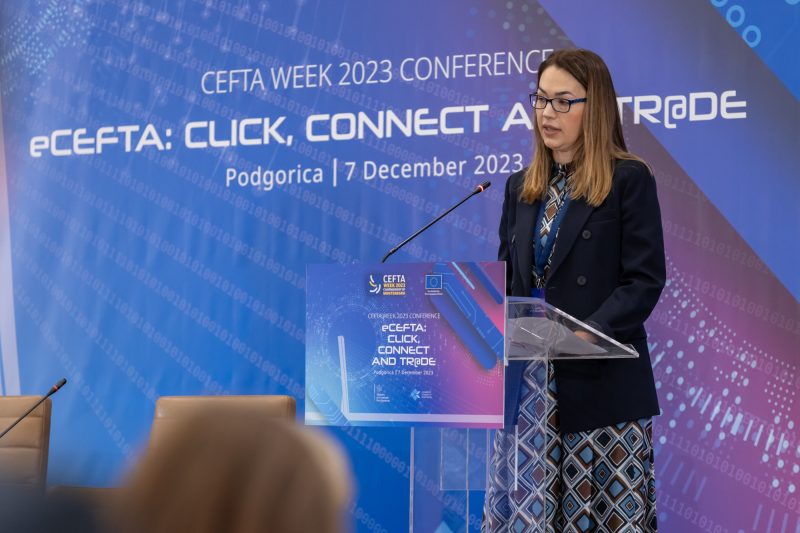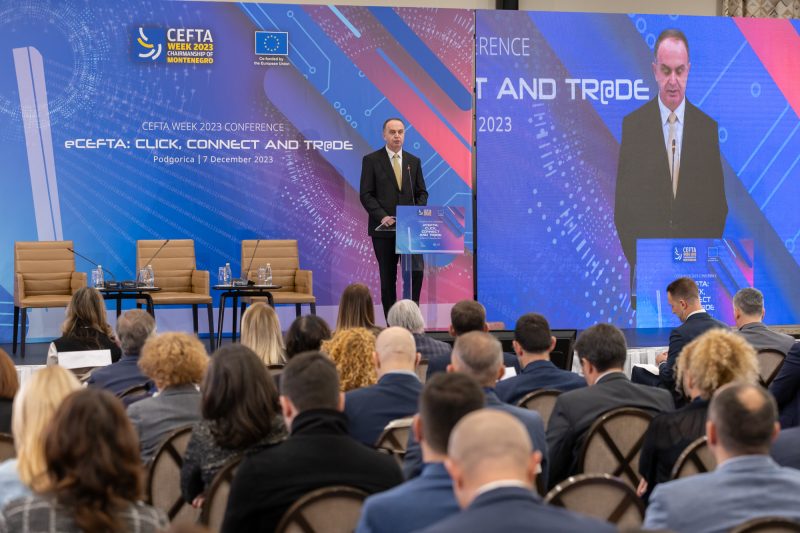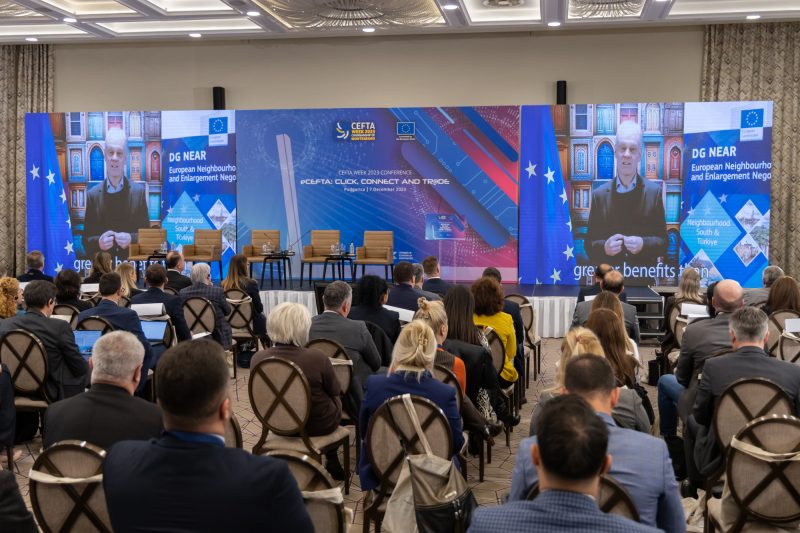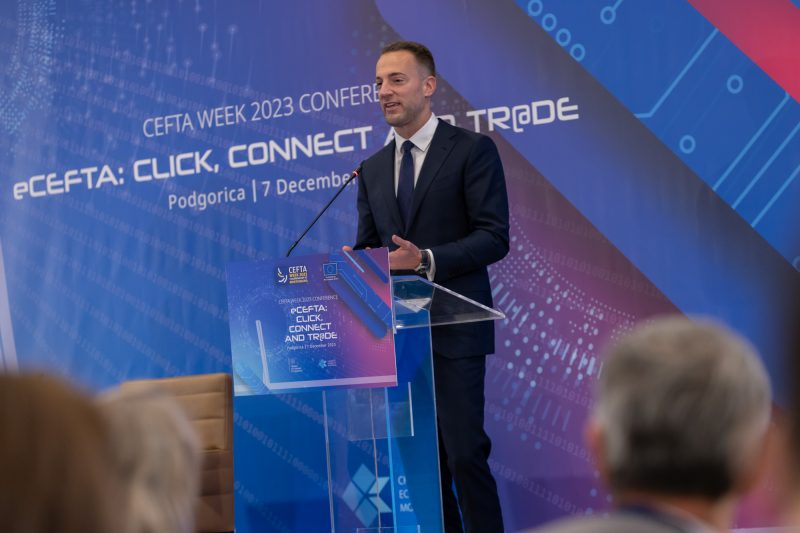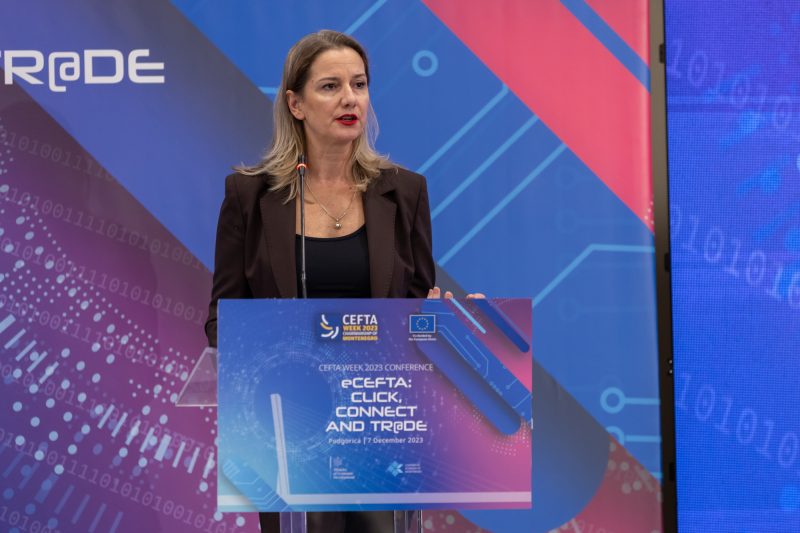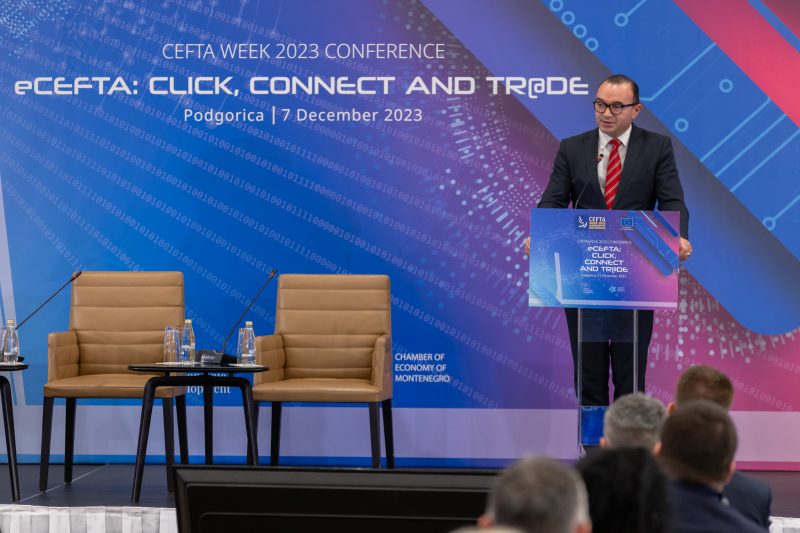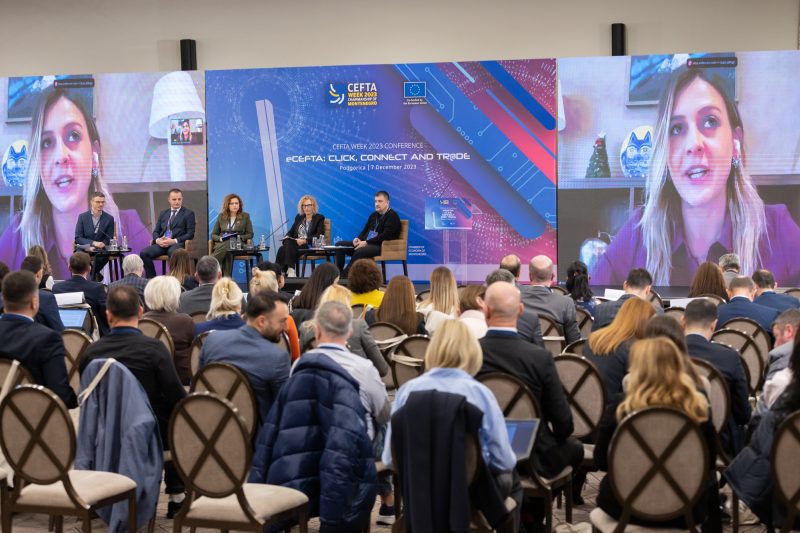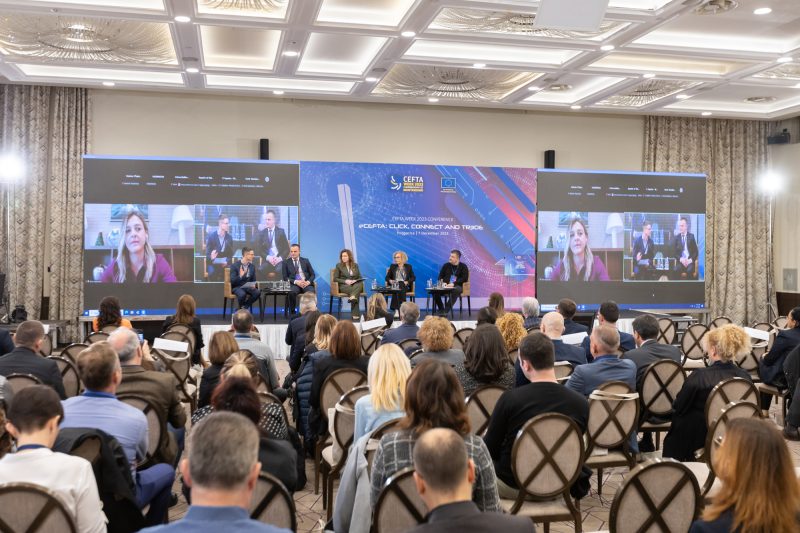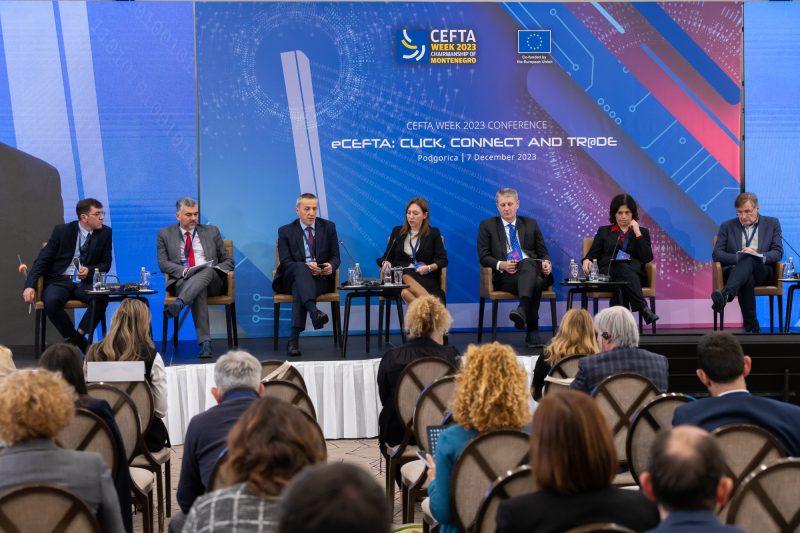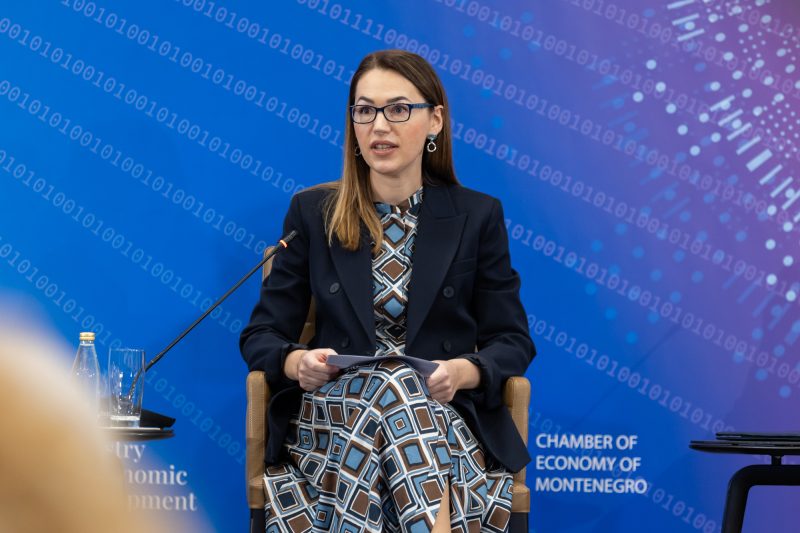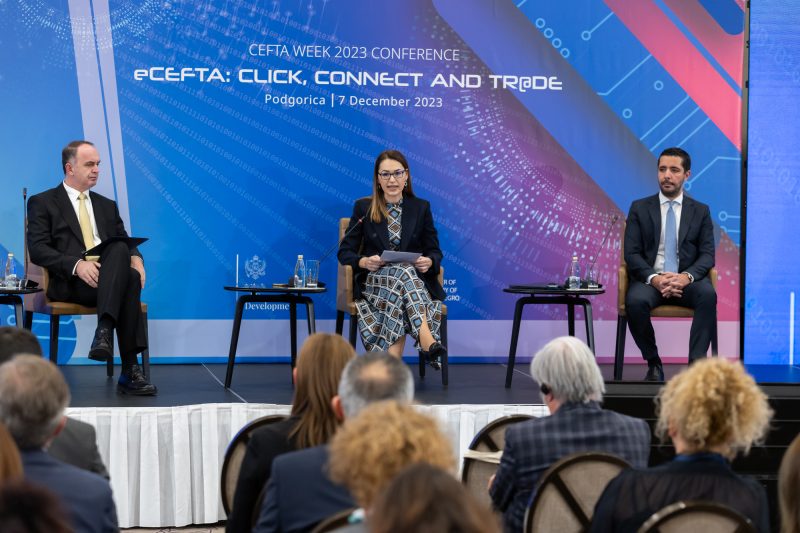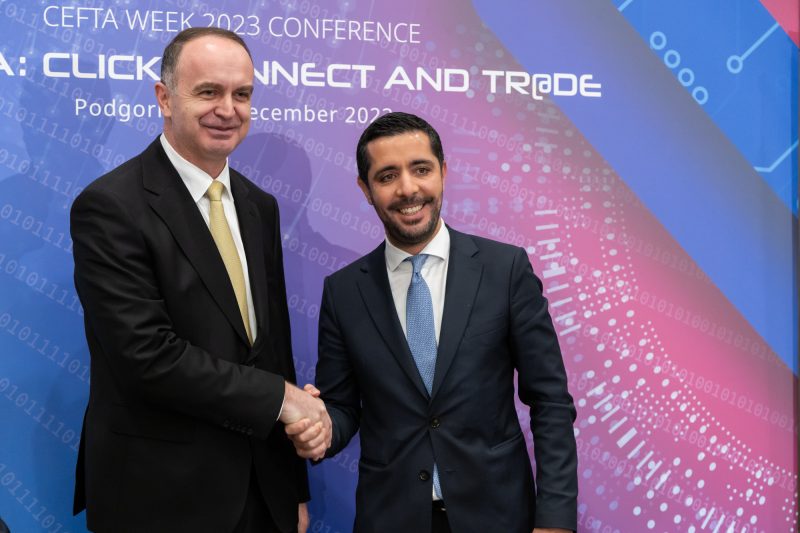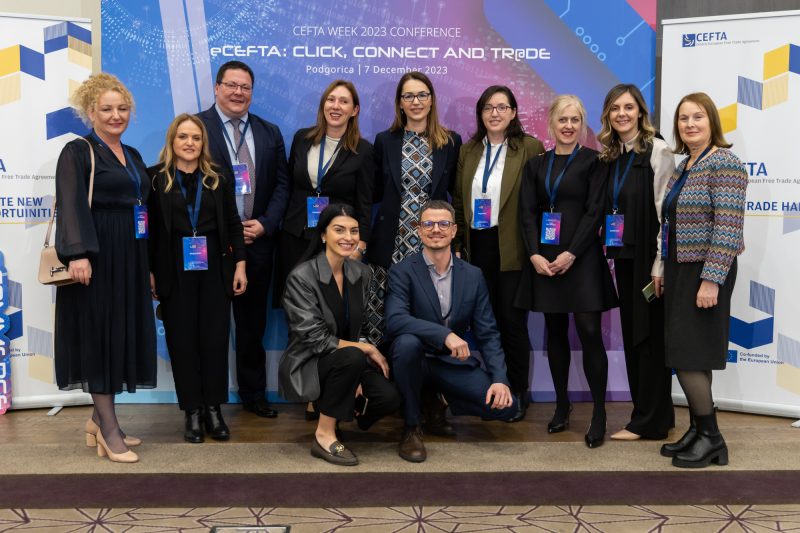Podgorica – December 7, 2023 – The CEFTA Week conference, titled “eCEFTA: Click, Connect, and Trade,” gathering more than 300 participants, in-person and online, took place today in Podgorica. The traditional yearly gathering of high-ranking officials from the CEFTA economies, European Union and other regional and international organisations, along with the business representatives, provided an occasion to explore the potential of digital trade, focusing on creating a more streamlined and interconnected trade environment. Additionally, it served as an opportunity to assess the outcomes that have been accomplished and set the stage for the future course of action.
Nik Gjeloshaj, the Deputy Prime Minister for Economic Policy and Minister of Economic Development of Montenegro, inaugurated this year’s CEFTA Week Conference, emphasising that the success of CEFTA today represents not only economic prosperity but also a strong step towards a European future.
„During the presidency of CEFTA, Montenegro has strived to enhance the functioning of CEFTA mechanisms, promote dialogue, foster common interests, and facilitate trade cooperation, which ultimately contributes to the promotion of growth and the creation of a sustainable perspective for all people in the Western Balkans. Cooperation with CEFTA is not only a to strengthen the regional economy but also a preparation for future integration into a wider European context. Montenegro is fully dedicated to improving regional cooperation through the implementation of the Common Regional Market Action Plan and CEFTA 2006, both significant instruments for accelerating economic convergence in the Western Balkans with the EU and developing good neighborly relations. Therefore, together with our EU partners, we will continue to work on strengthening our regional market, addressing challenges, and ensuring that CEFTA becomes an even more effective instrument of cooperation and development“, told Gjeloshaj.
In light of the new European Commission’s Growth Plan for the Western Balkans, Gert Jan Koopman, the Director General of the Directorate for Neighborhood and Enlargement Negotiations in the European Commission, has emphasized that the work undertaken within the Common Regional Market, the work that has been lead by the EU and CEFTA forms the foundation for giving EU Single Market access.
„Economic integration within the region is based on EU rules and standards, and alignment with the implementation of the EU acquis is the essential condition for closer integration within the EU Single Market. That is why the seven priority actions set out in our Growth Plan focus heavily on the work that you are carrying out: progress on e-commerce, parcel delivery services, and geo-blocking, to name just three areas, will open the door to the Single Market access“, said Koopman.
Summarizing the results for the year 2023, Danijela Gačević, Acting Director of the CEFTA Secretariat, emphasized the significance of the work carried out within CEFTA, stating that it addresses the needs of the economy, job creation, and the shaping of the future of our economies.
“The final confirmation of the importance of CEFTA’s work came from the New Growth Agenda for the Western Balkans, which recognizes CEFTA as a key mechanism for creating a common regional market, where digitalization plays a crucial role and holds a significant place”, said Gačević.
As she added, Montenegro’s presidency concludes with 9 agreed policies that have the capacity not only to revolutionize economies but also to improve the business environment and enrich the everyday lives of people.
“The potential of these decisions, once linked with the EU Single Market, cannot be overstated. It is a commitment to the prosperity of our region. The impact of our work is not just heard but felt. The future we envision for the CEFTA is within our grasp, waiting to be materialized through our determination and joint efforts,” concluded Gačević.
The Director of the Permanent Secretariat of the Transport Community, Matej Zakonjšek stated that digitalization plays a particularly important role in the field of transportation.
“We are working on digitizing all documentation related to all modes of transportation. We are doing this in collaboration with the European Commission, and according to studies we have conducted, complete digitalization can bring us savings of €163 million. Throughout this process, we must not forget that the development of transportation and digitalization must occur in parallel, and it is crucial that we are guided by ‘digital energy.’ This, along with everything else we do in the development of the transport community, will bring us the safest borders, which is what we owe to our citizens,” said Zakonjšek.
Acting Head of Programme Department RCC, Pranvera Kastrati stated that only dialogue and common cooperation can ensure benefits for the Western Balkans.
“Although there have been positive steps we have taken, there is still much work to be done. The development of human capital and mobility is key, and in this field, we have signed a large number of agreements. We are particularly focused on two approaches – to provide digital infrastructure so that citizens have the opportunity for better services. At the same time, we are working on developing digital skills because, according to research, only nine percent of citizens have a basic understanding of digital skills. I am confident that working on these, and other, fields will bring a new perspective to the Western Balkans and faster integration into the EU”, emphasized Kastrati.
The President of the Board of the Western Balkans 6 Chamber Investment Forum (WB6 CIF), Lulzim Rafuna stated that a Common Regional Market is a vision that brings a better future.
“Therefore, the economic integration of the Western Balkans is an important goal that will bring stability and prosperity. On this path, access to the EU market is imperative, and we are here to open up new opportunities for numerous companies. In the previous period, more than 6,000 companies from the Western Balkans were involved in many of our projects that allowed them to strengthen cooperation, receive useful training, and important support in their development. We have also established EU business platforms that provide space for WB countries to better prepare for the EU market and all its possibilities. We have implemented 63 projects and received support from all Ministries, and we have developed important digital solutions. In the coming period, CEFTA remains our important partner, and in the next few months, we will gather the chambers of commerce from all countries to bring new solutions for cooperation and even greater economic growth”, concluded Rafuna.
The focus of multiple panel discussions was on digitalization and e-commerce as transformative forces reshaping trade, with the aim of enabling businesses to access larger markets and providing them with the necessary policies and tools to effectively compete not only within the CEFTA but also in the EU Single Market.
In addition to the extensive range of themes that were addressed, the event also served as a platform for Montenegro to hand over the Chairmanship of CEFTA to Serbia. “In 2024, Serbia will have the opportunity to continue accomplishing one of the priority goals – regional networking and intensified trade cooperation for the benefit of economies and improvement of the quality of people’s lives. Next year, Serbia will be chairing CEFTA. The significance of the CEFTA market for Serbian economy is enormous. CEFTA is the second largest trading partner of Serbia, accounting for over 18 percent in the country’s overall exchange. Serbia’s presidency will primarily be focused on the consolidation and strengthening of the Agreement enforcement, work on boosting trade exchange among the CEFTA Parties, while providing us with the opportunity to add digitalization and e-commerce to the priorities. We see that economic cooperation based on the EU standards and principles within the CEFTA mechanism, and especially on profound enthusiasm of the Parties, brings results in the form of growing economic activity, trade, creation of new and better jobs. The Government of the Republic of Serbia and the Ministry of Trade firmly believe that free regional economic cooperation is of exceptional relevance, as confirmed by the fact that Serbia recorded nearly EUR 5 billion in the trade exchange with CEFTA in the first nine months of this year,” said Minister of Trade, Tomislav Momirović.
The CEFTA Week 2023 Conference was jointly organised by the Ministry of Economic Development of Montenegro and the CEFTA Secretariat, with the support of Chamber of Economy of Montenegro.


